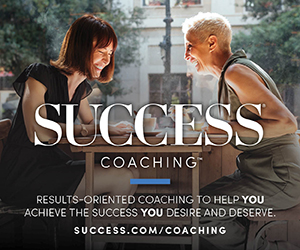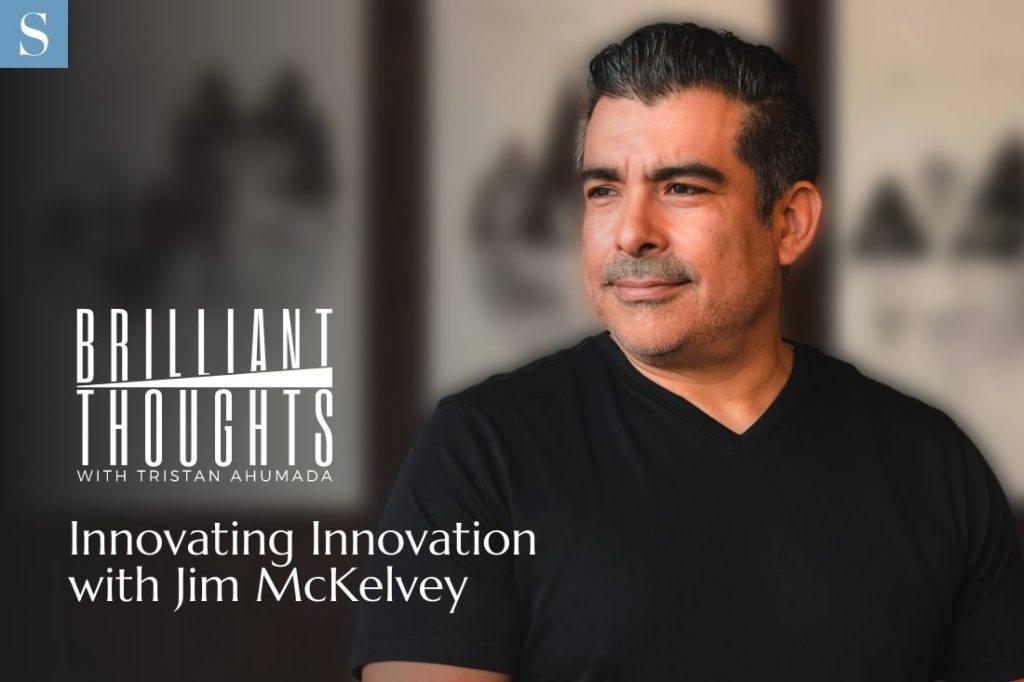Glass-blowing isn’t a hobby we generally associate with billionaires, but then again, Jim McKelvey isn’t your average tech tycoon. He learned some of his most valuable lessons about timing, process and innovation in his glass-blowing studio, concepts that would guide him to eventually co-found the company Square.
McKelvey recalls attending a 10-day glassblowing course, studying under a master in the field. Despite 15 years of practice, he was unable to create basic forms with any real consistency. He used his one allotted question for the entire course to ask the teacher how to do a basic technique, expecting him to demonstrate. Instead, the master talked McKelvey through the entire process, giving step-by-step directions. This led to a major realization.
“The technique that I had been using was the correct technique, but I wasn’t getting the timing right,” McKelvey explains to Brilliant Thoughts’ host Tristan Ahumada in a revelatory new interview. “And it was this lightbulb moment in my life because I realized that just like in the studio, there were many other places in my life where I was doing the right thing, but I was doing it at the wrong time.”
The right timing often feels wrong.
Like glass designs that spend too much or too little time in the kiln, even brilliant inventions can be thwarted by poor timing. Unfortunately, timing isn’t exactly something most people are taught to gauge, and we tend to feel the most comfortable and confident when moving in the same direction as the rest of the herd. As a result, pursuing a distinctive path, even if it’s the right one, can feel daunting.
“Oftentimes, we ignore timing, just because it’s a hard question to answer,” McKelvey says. “And if you’re doing something innovative, almost always the right time feels too early.”
To combat the uncertainty of timing, many people want a checklist to follow, a formula that assures them they’re on the right path. In fact, that’s exactly what McKelvey’s first publishers asked for when he submitted the finished manuscript of The Innovation Stack, a checklist of five to seven well-defined steps. McKelvey had to explain that there was no roadmap to problems that had never been solved before.
True innovation is a last resort.
Many people have the desire to innovate but don’t know what that looks like. At a basic level, they should start with doing what they love and are good at, working toward a problem they can realistically solve. Still, many people ask McKelvey how to become an entrepreneur.
“I think entrepreneurship is a dead concept,” McKelvey says. “The original meaning of the word ‘entrepreneur’ meant somebody who was doing something that everyone else thought was crazy… Today, entrepreneur just means anyone who starts a company.”
He feels the same way about innovation, saying people use it as a “dessert topic” to be sprinkled on all of their actions for extra flavor. This casual treatment of the word does a great disservice to people who actually find themselves with no other option but to innovate. In those moments, they will feel unqualified, and if they’re trying to do something that’s never been done before, they will be. However, that shouldn’t be a deterrent.
“Look, you’re not qualified, you are absolutely not qualified to do something the first time, no human is,” assures McKelvey. “All human progress is made initially by an unqualified individual.”
That being said, McKelvey doesn’t support innovation for its own sake; he believes that reinventing the wheel should be the last resort. If anyone has already solved the problem that you’re working on, you should learn the solution from them. It’s only when people find themselves at the edge of human knowledge that innovation is the appropriate next step. He wrote The Innovation Stack for people who find themselves on the other side of that line, unsure how to move forward.
Normal people transform the world.
McKelvey says that at some point in life, everyone finds themselves standing on a precipice, that edge of humanity that no one’s crossed yet. Choosing whether or not to cross is an individual choice, and there’s no right or wrong answer. However, it’s a mistake to think that only heroes make the leap.
“Everybody I studied in the book, everybody I’ve profiled, myself included, we’re just normal folk who end up in weird situations, and then we don’t quit for some reason,” he explains. “But that’s the story that nobody ever tells you—it’s an everyman story.”
The people who transform the world don’t have superpowers. They aren’t fearless and certain. They are normal people, distinguishable only by a will to survive and a willingness to go first.
If you build a hover car, paint it metallic sparkle pink.
When McKelvey was inventing the Square reader, he found himself torn between aesthetic and functionality. He prototyped two readers: a smaller, cuter one that didn’t always get a clean card read and a larger, less cute one that performed way better. When he demonstrated both to people, he noticed a strange effect.
“If I made them use the big one, they were sort of like, okay, it reads the credit,” he remembers. “But if I got them to use the little one, they’d be like, what the hell just happened? Show me that again!”
He says that people were mesmerized by the small, roughly one-inch wide early Square reader, and reacted as if it were a magic trick. They couldn’t believe something so small could read a credit card, and even though it utilized the same ground-breaking approach as the larger one, people strongly preferred the smaller Square.
If you’ve never invented anything new, you might assume that brand new products and ideas automatically get a lot of attention. McKelvey says this is not the case at all.
“[For instance] you could invent a hover car,” he explains. “This thing could levitate 10 inches off the ground, never touch the ground, and I guarantee you could drive it around the city all day, and nobody would stop.”
People won’t notice even the most revolutionary technology if it doesn’t look exciting. That’s why it’s essential to create designs that stand out, even shock people. In a final word on the subject, McKelvey leaves listeners with this advice:
“If you build a hover car, paint it metallic sparkle pink.”
Brilliant Thoughts with Tristan Ahumada is no longer releasing new episodes on the SUCCESS Podcast Network, but you can still listen to the full conversation below.





